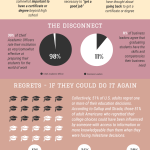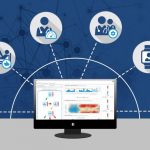How Data Analytics Can Guide Higher Education and the Future Workforce [Infographic]
— September 11, 2017
The majority of Americans, or 97%, believe in higher education and, in the past year, approximately 47% have thought of going back to school. In today’s world, landing a good-paying job with excellent prospects for advancement is the common goal of many – from parents to high school graduates and to professionals already in the work force. Yet, we have found that the primary concern of business owners is hiring applicants with solid work experience.
Here’s the dilemma: The quality of education and training don’t always measure up to the demands of the market. Many of the degree choices today are extremely specialized, but students are not properly motivated by their professors to pursue excellence in spite of studies that have shown that 59% of graduates who were trained in deep and experiential learning performed better in the workplace than those who barely scratched the surface of a curriculum. For me personally, the hands on experience I gained prior to going back to college has taught me a great deal in real world experiences, from improving business processes using workflow automation to communicating with people, especially in difficult or challenging situations.
I attended the Council for Higher Education (CHEA) conference in January and found the session conducted by Brandon Busteed, with Gallup absolutely fascinating. Earlier this year Gallup published the results of a daily poll of over 350 American adults that ran for a year essentially revealing the following:
![How Data Analytics Can Guide Higher Education and the Future Workforce [Infographic] | DeviceDaily.com How Data Analytics Can Guide Higher Education and the Future Workforce [Infographic] | DeviceDaily.com](https://www.devicedaily.com/wp-content/uploads/2017/09/How-Data-Analytics-Can-Guide-Higher-Education-and-the-Future-Workforce-Infographic.png)
Culling all answers, about 51% of those surveyed had at least one regret (specialty, school, or field) about their tertiary education. Moreover, up to 66% of those who went to a for-profit school said they regret at least one of their decisions on college education. In a nutshell, many Americans with student loans feel that the cost of a degree was not justified.
On top of the pressure to select the right degree, pay for their education, and deal with the anxieties of passing, graduating, and finding a job, young adults also have to face mounting pressure from peers and the older generation who remember their college days – a period vastly different from the situation today.
Let’s lay the predicate: To be successful, you have to love what you do. If Americans were given the inside information from data analytics, they would be in a better position to make a career choice they possibly would not regret.
Schools and accrediting agencies can help the next generation understand trends and offer greater value to incoming students that will last a lifetime.
Along with this same frame of mind, accreditation agencies can tap into available data on student population and trends to streamline their processes more efficiently and accurately to enhance the quality of their reviews. Based on a series of Gallup polls on education, those who took their time in deciding their degree were less inclined to regret their decision which would suggest that this is the proper way to approach higher education instead of jumping immediately from high school to college – a concept that is also known as “Gap Year.”
Using the best data analytics, organizations can study data on the gap years and other relevant information that can help them plan and strategize. For instance, if you want to attract a specific kind of employee or business, data gathered from gap year students aka “gappies” performed academically better in school and more likely to graduate with a higher GPA than those who went straightaway from high school to college regardless of high school performance.
The Power of Data Analytics
You can make a difference in the lives of every person you connect with using data analytics. According to Gallup and Strada, those 51% of adult Americans who regretted their college choices could have been influenced by someone with access to information or more knowledgeable than them when they were facing milestone decisions – and they would potentially be enjoying a happier, more productive life.
The barrier that prevents many from accessing the power of data analytics is the sheer magnitude of the technology. A citation in Forbes predicts that by 2020, 1.7 megabytes of new data will be created every second, which opens up a whole other market in cyber security. Regardless, without analytics, you could be getting the wrong information and put yourself at a disadvantage in achieving certain goals. On the downside, advanced analytics is not a skill you can learn overnight, nor can it be aggregated properly using manual processes.
Digital & Social Articles on Business 2 Community
(75)

![How Data Analytics Can Guide Higher Education and the Future Workforce [Infographic]](https://www.devicedaily.com/wp-content/uploads/2017/09/How-Data-Analytics-Can-Guide-Higher-Education-and-the-Future-Workforce-Infographic-520x1287.png)









